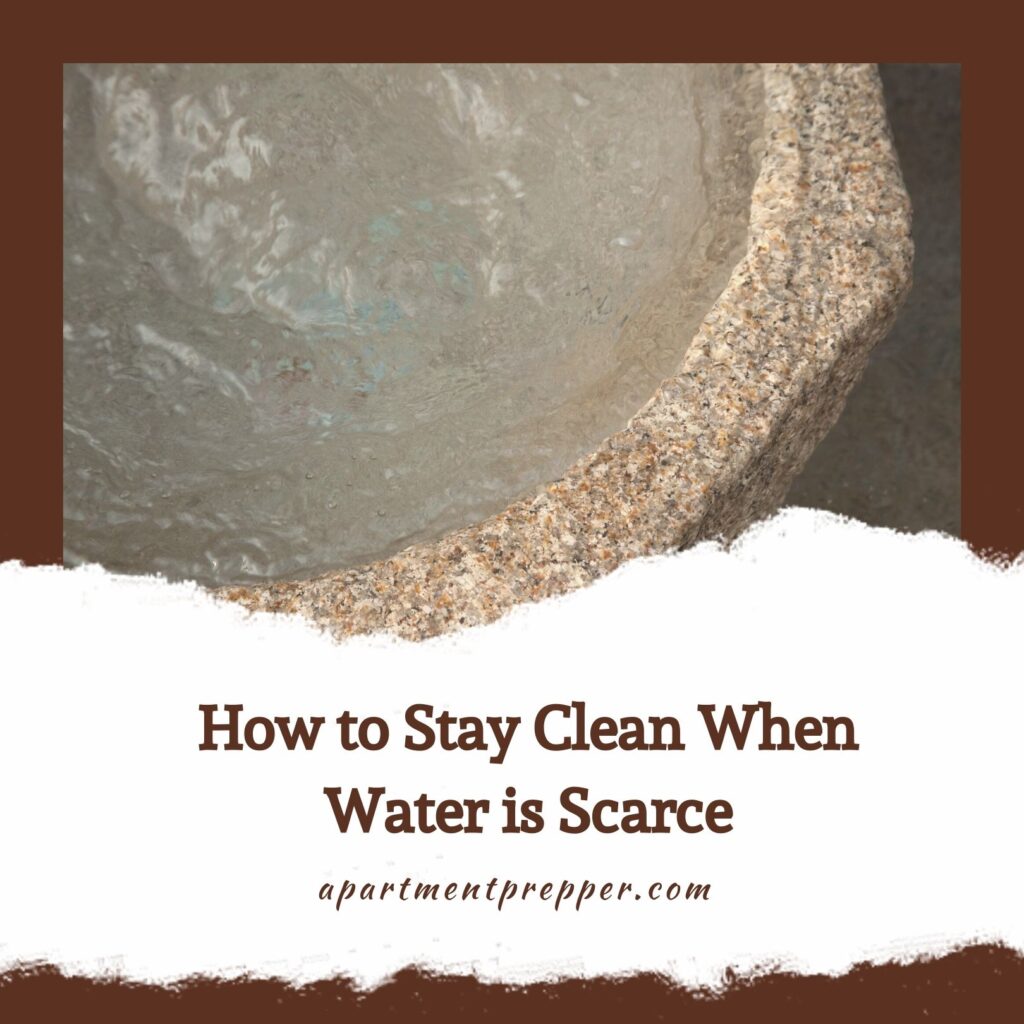Written by Bernie Carr
Thousands of people in Texas and Mississippi went without running water for several weeks as a result of the recent severe winter storms. Some residents did not have running water for over two weeks. To flush toilets, they had to use melted snow or collect rainwater. Some residents even had to check into hotels just to get a shower.
In a dire emergency, people would ration stored water mainly for drinking. But maintaining hygiene, especially in an emergency and a pandemic is a priority as well. If you only have a small amount of water, here are a few ways to stay clean.
Ways to stay clean when water is scarce
Sponge bath
Showers use up a lot of water: an eight minute shower uses around 20 gallons of water, and most people take more than eight minutes showering. Use a wash cloth or sponge with a small amount of water, and soap. Start wiping yourself from the top down, starting with your face.
Wipes
Stock up on baby wipes or cleansing wipes before an emergency happens.
Personal cleansing wipes or adult wash clothes can also be useful for emergencies when you are unable to shower.
Rinseless shampoo
One of the most annoying things about not being able to shower or wash your hair is having an itchy scalp and greasy hair.
Keep your hair clean by using rinseless shampoo. Originally developed for camping trips or hospital stays, rinseless shampoos can be relied upon to keep your hair clean without having to use water in the aftermath of a disaster.
I tested the No Rinse shampoo and oversized body wipes a while back and had good results.
Antibacterial gel
Soap and water is still the best for keeping your hands clean, but if you are short on water, antibacterial gel will do. Stock up on antibacterial gel and wipes, now that they are available again.
Baking soda
Baking soda can be used as a soap substitute. Mix a tablespoon of baking soda with hree cups of warm water. Use a washcloth or sponge to scrub each part of your body starting with your face, down to your feet.
You can also use baking soda to clean your teeth instead of toothpaste.
Sprinkle baking soda on your feet to avoid foot odor.
DIY Dry shampoo:
Mix 1/4 cup baking soda and 1/4 cup cornstarch. Sprinkle the mixture on your hands and apply on your scalp. It will absorb excess oils and freshen your hair. Shake off any excess.
Baby powder also works as a dry shampoo.
Wear gloves
Avoid getting your hands dirty by wearing disposable gloves.
Hygiene kit
Put together a hygiene kit for each member of the family to make sure you have supplies in a disaster. Assemble the following items in a portable container such as a 5-gallon bucket or backpack:
- toothbrush
- toothpaste
- floss
- baby wipes
- antibacterial gel
- paper towels
- toilet paper
- trash bags
- soap
- feminine hygiene products
- razor
- disposable gloves
- baking soda
- plain bleach
- deodorant
- foot powder
Practice water conservation
Learn how to conserve water while it is plentiful. Boost your water supplies by buying a few extra gallons of water for emergencies. Learn everything you can about water and survival. Do your own research, or read Daisy Luther’s book, The Prepper’s Water Survival Guide.
We are an affiliate of Amazon.com, which means we received a small commission if you click through one of our Amazon links when you shop, at totally no cost to you. This helps keep the lights on at the blog. Thanks!
About the author:
Bernie Carr is the founder of Apartment Prepper. She has written several books including the best-selling Prepper’s Pocket Guide, Jake and Miller’s Big Adventure, The Penny-Pinching Prepper and How to Prepare for Most Emergencies on a $50 a Month Budget. Her work appears in sites such as the Allstate Blog and Clark.com, as well as print magazines such as Backwoods Survival Guide and Prepper Survival Guide. She has been featured in national publications such as Fox Business and Popular Mechanics. Learn more about Bernie here.


